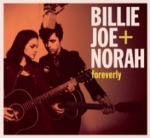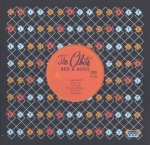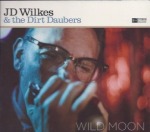Two years ago, Hank3 released four albums from very different genres. Some were much better than others. Now he’s back with two albums (one a double) that total almost two and a half hours of playtime. It’s not surprising that one of them is country (Brothers of the 4×4) and the other punk (A Fiendish Threat), but it is interesting to see that neither is very similar to what he was doing in 2011. Love him or hate him, it’s obvious that he’s always pushing himself and unwilling to play it safe.

Hank3 – A Fiendish Threat
Let’s get the bad news out of the way first: The punk album is disappointing. It’s not bad, but it rarely feels like his heart is in it, either. It became obvious with his last crop of releases that Hank3 has only a passing interest in lyrics and mostly focuses on constructing soundscapes. But punk has to be a lot more about the lyrics and less about the “construction”, so it mainly sounds like an imitation of a genre he’s interested in. Some songs use sped-up country instruments and rhythms, which add a unique twist, but otherwise this doesn’t stand out. Hank3 needs to find a producer and editor he can trust, rather than running everything himself, because someone else would have made this leaner and shorter. More importantly, Hank3 needs to figure out what he wants to say when he does this. It’s a good sound, but it’s not compelling punk.

Hank3 – Brothers of the 4×4
Brothers of the 4×4, on the other hand, is one of his best albums. He obviously isn’t beholden to the over-the-top rebellion he pioneered in the last decade, but he isn’t necessarily interested in returning to his early traditional music, either. That rebel is still part of him, but he doesn’t feel the need to press the issue. Songs here are more likely to be about complex relationships or his love of nature as partying and fighting. In fact, “Farthest Away” is a surprisingly introspective song about a relationship growing cold, and in “The Outdoor Plan” he sounds more excited about finding bear tracks than he used to be about drugs. He even talks about wanting to find a woman to settle down with. There’s no doubt that this is an honest slice of life from someone who refuses to be pigeonholed by anything in his past.
The songs are long, though. Almost half of them cross the six-minute mark, and album-opener “Nearly Gone” is eight and a half. The first time I listened to it, I was saying “this sounds good, but it’s a bit long” by four minutes. Long, repetitive refrains and instrumental breaks are used in almost every song.
They sound good, though, and I enjoy it now that I’m over the initial shock. Hank3 has written good songs, and he takes the time to play with each one’s sound. I wouldn’t quite call this his “jam band album”, but if I wanted to convince someone from that scene to try country music, this wouldn’t be a bad album to start with. Each song does have a distinct sound, from the electric riffs in “Hurtin For Certin” to the clawhammer banjo in “Possum In A Tree”.
The lyrics are still sometimes weak. I can ignore the repeated “Losing like a loser who’s got nothing to lose” in the otherwise-good “Deep Scars”, but “Held Up” is nothing but bad repetitive rhymes about visiting each southern state. (“Ain’t nothin’ like the feel of Virginia’s vagine.” Seriously?) Hank3 isn’t stuck in the trap of repeating themes from old albums, though, as he seemed to be in 2011, and so they are almost always new and interesting enough to carry the songs.
The 89-minute running time gives me plenty of chances to enjoy it and then to get bored. As with A Fiendish Threat, it wouldn’t hurt to have someone else to force Hank3 to pare this down sometimes. However, most of it is very good, and I think that almost every song on here will be someone’s favorite. Personally, I keep coming back to the catchy “Hurtin for Certin”, the freewheeling groove of “Dread Full Drive” and “Toothpickin”, and the depressed, human groove of “Deep Scars” and “Farthest Away”. “Looky Yonder Commin” is also a great song full of personality and confidence, which surprised me because the odes to his coon-hunting dog were the weakest part of his last country albums.
A lot of baggage and expectations always come along with Hank3’s new albums, but if you set all that aside and just look at the music, Brothers of the 4×4 may be his strongest country effort ever. He’s confident and experienced, and that rebel energy that could have driven him to an early grave has instead been harnessed to keep him experimenting with new sounds. This one has a couple songs that just need to go, and several more that should have been cut back, but there’s still more than one full album of great stuff here.
A Fiendish Threat: C
Brothers of the 4×4: B+









